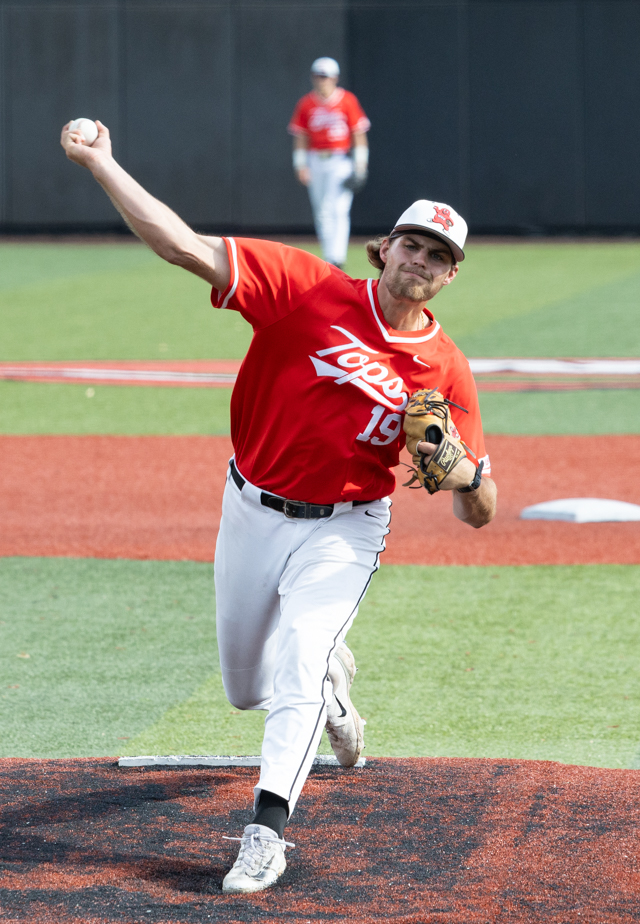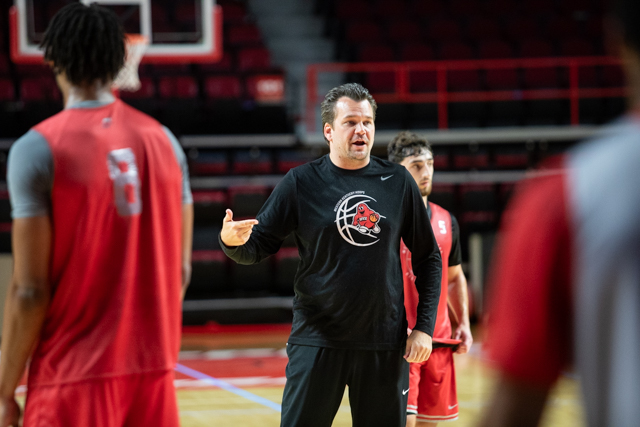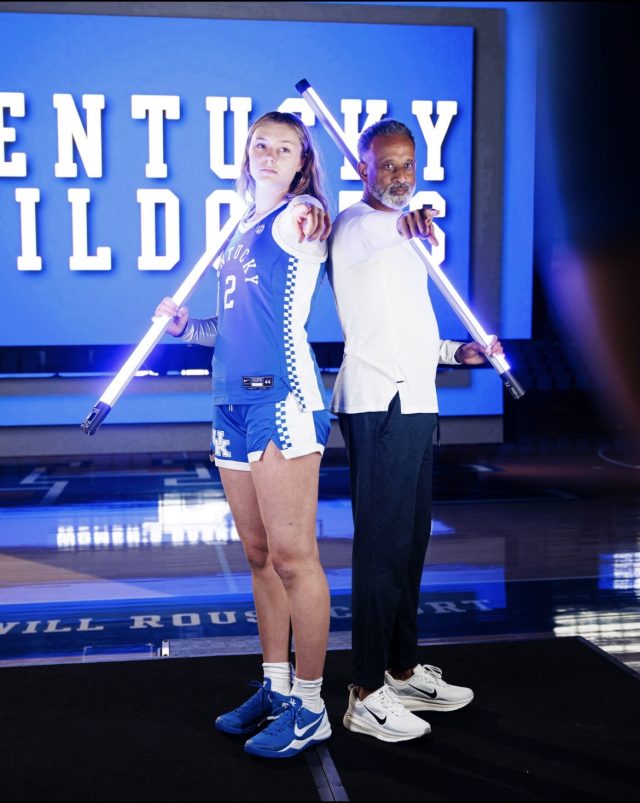Leading By Example
Published 12:00 am Sunday, January 27, 2008

- Jimmy Feix sits at his home last week in front of a wall covered in football memorabilia, which he jokingly calls his “ego wall.” Feix, the former Western Kentucky football coach, was recently inducted into the Fellowship of Christian Athletes Hall of Champions in Kansas City, Mo.Miranda Pederson/Daily News
Who is this Jesus you guys keep talking about?
The question sticks in Jimmy Feix’s brain. It’s been there since the late 1970s, when it was posed by a young Western Kentucky football player named Paul Sheehan.
Trending
Sheehan remembers the query well. When Sheehan came to Bowling Green from Ontario, Canada, he knew no one. So a roommate invited Sheehan to a Fellowship of Christian Athletes meeting at WKU, which Feix had established only a few years earlier.
It was the beginning of a life-changing time for the young player.
The Sheehan who arrived at the early gatherings knew little about “this Christian business,” says Feix, who was also Sheehan’s football coach.
“It was all new to me,” Sheehan says. “I might have gone to church, but I didn’t pay much attention when I was little. I remember saying, like, ‘Tell me, who is this Jesus, and what does he want us to do?’ ”
Feix, on the other hand, accepted Christ at the age of 9 at an old German evangelical reform church in his native Henderson. It was unplanned – the preacher’s words that Sunday about sin and damnation struck the little boy, and he asked his mother if he could go up front at the invitation. The preacher spoke about going to Hell; Feix decided he didn’t want to do that. His mother was thrilled.
About 40 years later, Sheehan made his own trip down the aisle at the former 12th Street Church of Christ in Bowling Green. The two men’s religious journeys were different, but Sheehan might never have reached the altar – or have launched what’s become a 29-year career in ministry – without the influence of Feix and FCA.
Trending
“Spiritually, through the FCA, (Feix) got me interested in thinking about the Lord,” says Sheehan, currently the minister at the Kaysville Church of Christ in Kaysville, Utah. “Now 29 years I’ve been preaching. … He was always instrumental in me thinking about God.”
Feix quickly recalls Sheehan’s story when talking about his 30-plus years of devotion to FCA. Feix – an almost impossibly humble man, considering the myriad awards and inductions and facility-namings his athletic career produced – often says FCA gives him “much more of a blessing than I provide.”
That may be true, but Feix gives plenty to FCA. So much, in fact, that earlier this month he was elected to the national FCA Hall of Champions in Kansas City, Mo. – an honor previously bestowed on such high-profile sports figures as Tom Landry, Bobby Bowden, Tony Dungy and Tom Osborne.
Sheehan’s calling is something to which Feix, now 76, didn’t aspire. Feix is a coach, and he did so with legendary results on the Hill. But FCA offered Feix a way to intertwine his faith with his profession. Feix never dreamed such a thing was possible until then-WKU athletic director John Oldham dispatched Feix to a surprise destination in the early 1970s – Black Mountain, N.C., to represent WKU at an FCA function.
“I said, ‘Oh, Johnny, I don’t believe I could do that, I’m not that good of a Christian. I’m an awful bad sinner to be an example like that,’ ” Feix says. “He said, ‘Oh, no, Jimmy. It’s for sinners like you.’ ”
Feix knew nothing about FCA before the trip. But the experience was “exhilarating.” Feix understood how he could use coaching as a platform, without having to be a preacher.
“That was a time when confession of Christianity made you a sissy,” Feix says. “You weren’t mean and tough enough if you were a follower of Christ. Of course, He was the toughest guy who ever lived. We didn’t see that. Those big, strong guys didn’t go to church and that sort of thing.
“FCA helped convince a lot of athletes to, as it were, come out of the closet and make a public confession of where your strength really lies.”
The North Carolina trip planted a seed. Oldham doesn’t remember exactly why he offered the assignment to Feix. Oldham suspects he simply had a scheduling conflict, because he’d previously attended FCA events himself.
Whatever the reason, Oldham was not surprised when Feix returned from Black Mountain and founded the first WKU “huddle” – FCA’s term for local gatherings.
“Didn’t shock me,” Oldham says. “You never know when you get someone involved in something like that how they’ll take hold and take off running.”
Feix’s Thursday night huddles were held in a classroom at the football stadium, then later moved to the larger locker room. Topics included whether pets went to heaven. The huddle was student-run; Feix says he simply served as an adviser. FCA’s national headquarters sent a few materials, but the group was largely on its own.
“The big boost was when women athletics started,” Feix says. “The women started coming, and then the men started coming. I don’t know which attracted which, but our enrollment grew.”
At one point, Feix’s FCA huddle was the largest collegiate group in America, says Bryan Veatch, area director for FCA’s 11-county Barren River region.
Veatch, an all-state prep punter who came to play football at Western in 1986, nominated Feix for the FCA honor last year. When Veatch arrived on the Hill as a player, he didn’t realize the reach of Feix’s fame. But he’s learned, especially after taking the full-time FCA job in August 2004.
The men have built a relationship of mutual admiration – Veatch appreciates Feix’s willingness to speak regularly to area teams and at banquets; Feix lauds Veatch’s efforts in organizing and expanding FCA.
“It was, in my estimation, kind of a no-brainer (to nominate Feix),” Veatch says. “Coach Feix is known well beyond the realm of WKU.
“It was pretty interesting, I had (University of Tennessee football coach Phil) Fulmer come to town last spring, and when he walked up most people were enamored with Coach Fulmer. But Coach Fulmer was kind of that way with Coach Feix. He had heard of Coach Feix, and it was kind of a neat thing to watch.”
Veatch gathered letters of recommendation from several marquee names in WKU athletics. There were testimonials from former players such as Romeo Crennel, Darryl Drake, Pete Walters and Wayne Bush, as well as football coaches David Elson and Jack Harbaugh. WKU president emeritus Dero Downing wrote a letter, as did Feix’s minister at First Baptist Church in Bowling Green, Mark Hopper, among others.
Nominees can remain on the Hall of Champions ballot for three years, Veatch says. Feix was picked on the first try.
Feix still has trouble believing he was selected.
“No way – particularly when you think about Tom Landry and Bobby Bowden, some of those very famous people who have used the Fellowship of Christian Athletes as their platform,” Feix says. “It was overwhelming – I can understand maybe being nominated, because of the long time I had been associated, but to even be considered to go into with those kind of people … I had no idea that I could be elected.
“I think the people that wrote letters maybe enhanced my abilities.”
Mike Miller isn’t buying that slice of self-effacement. Miller played football at WKU in the late 1970s and early 1980s, and Feix’s FCA leadership left a deep impression. Miller has worked 22 years for FCA, and he’s currently an Atlanta-based senior vice president for the national organization.
Miller says his career owes a debt Feix.
“He just had such a great influence,” says Miller, who surprised Feix by showing up at the Kansas City induction event. “He lived out his faith. (FCA) was an incredible place for me to plug into as a student-athlete. I grew more through my faith because of his example. He was just an encouragement to all of us.”
Feix’s lore at WKU is well known. His standout quarterbacking for the Hilltoppers from 1949 to 1952 resulted in WKU’s first bowl appearance – a victory over Arkansas State in the 1952 Refrigerator Bowl – and in the retirement of his No. 66 jersey, one of only four such honors in the program’s history.
After his collegiate career ended, Feix’s stint in the NFL was short-lived – he signed a contract with the New York Giants, but absorbed a vicious hit to the face during an exhibition game in 1953. The injury led to recurring nosebleeds, and Feix couldn’t play football again. It was off to the Air Force.
Feix was nearing the end of his enlistment a few years later, trying to decide whether to leave the military or to make the Air Force his career. Stationed at Fort Bragg, N.C., Feix unexpectedly experienced a moment of clarity. As Feix taught a 15-year-old Pony League baseball player how to pick off a baserunner, the lesson was suddenly interrupted.
“While I was talking to him, one of these big C-119s flew over – that’s what I flew, the C-119 troop carrier,” Feix says. “Noisiest thing in the world, and our ballfield was right under the flight pattern, where they’d go around and they’d land.
“I had to stop talking because it was so noisy he couldn’t hear me, and when I looked up there I thought, ‘There’s two guys up there in flight suits, and they’re hot, and they’re sweaty, and they’re worried about whether that gear’s down and all the way locked, and whether that gas mixture’s in the right thing.’ And here I am down here with this breeze blowing, and I’m in my shorts and T-shirt, and I’m talking to this 15-year-old and he’s just eating me up, whatever (I say).
“I went home after lunch and I told my wife, I said, ‘Honey, we’re going to get out of this Air Force and I’ve got to find me a coaching job somewhere. I want to be a coach.’ ”
A few weeks later, Feix received a phone call from then-Western president Kelly Thompson. The school was hiring a new football coach, and Thompson wanted Feix to return as a graduate assistant.
“Man, I pretty near climbed through the phone lines,” Feix said. “(Thompson) wouldn’t tell me who the coach was going to be, but he said, ‘We’re going to announce it, and we’d like to announce you’re coming back at the same time.’ I said, ‘You said that right.’ ”
If it wasn’t divine intervention, it was at least awfully good timing. Feix returned to WKU in 1957 and never left. The new head coach turned out to be Nick Denes, who eventually hired Feix as a full-time assistant. Feix coached under Denes until taking over as head coach in 1968.
“I had no idea that we’d be here forever,” Feix says. “And we didn’t have that many opportunities to move. There would come up chances to move somewhere else, to another school, or to move up the so-called coaching ladder to a bigger school or that type of thing.
“I just never was interested. I just thought we did it the way it ought to be done. The values we promoted and the support the had was the way it ought to be.”
Feix says he appreciated the nurturing atmosphere at WKU. It was a perfect fit for the gentle, gracious man, and his influence continues to be felt on the Hill.
“I think he’s very passionate about his love for WKU and WKU athletics,” says Wood Selig, Western’s athletic director. “He literally wears it on his sleeve. He’s always in red. He’s always at our events or our meetings, he’s just always so positive and upbeat with a smile on his face and a word of encouragement. It’s hard not to want to spend as much time with someone like that as you possibly can. The world is full of too many naysayers and negative individuals.
“There are certain father figures in every family and coach Feix is absolutely one of the primary father figures for our entire program.”
Feix produced 106 victories as head coach from 1968 to 1983, the most in school history. His teams won or shared six Ohio Valley Conference titles and advanced to NCAA Division II championship games in 1973 and 1975. After retiring from coaching, Feix served as WKU’s athletic director from 1986 to 1991.
He’s a member of WKU’s Hall of Distinguished Alumni and the school’s Athletics Hall of Fame, as well as the Kentucky Athletic Hall of Fame. The field at Houchens Industries-L.T. Smith Stadium is named in Feix’s honor.
Feix appreciates those things. He’s extremely proud of his athletic career – witness the “ego wall” in the Bowling Green home he shares with his wife of 55 years, Frankie. The den is filled with memorabilia from his playing and coaching days.
But he says the FCA recognition is in a different category. A crystal plaque commemorating his Hall of Champions induction is perched on the mantle, and Feix eagerly shows it off to visitors.
“It’s something probably that has more long-term impact than any of the other recognitions that we’ve had … ,” Feix says. “They’re more ‘not religious’ types of things. They’re secular. But the eternal meanings of being recognized as a representative of Jesus Christ is something that’s just above and beyond anything you can imagine.”
For Feix’s players, it’s not football stuff that matters most.
Roughly a year after Sheehan first attended Feix’s FCA huddle, Sheehan was ready to deliver his first sermon. He chatted with Feix about it one day, mentioning that the sermon would be at 6 p.m. Sunday at the Eastside Church of Christ in Bowling Green.
“That’s all I thought about it,” Sheehan said, figuring Feix hadn’t paid much attention. “Then we sang a few songs, then it came time for me to preach. Of course, I was nervous, and lot of the guys from the team came to watch me and listen.
“Sitting at the back – he came in as inconspicuous as he could – was Coach Feix. He came and listened to me. I remember when the sermon was over, people were coming up, and he waited. He said, ‘You know, Paul, I’m real proud of you.’
“I’ll always remember that. He was a busy man, he could of done lots of things that Sunday night – in fact, we probably had a meeting at 7 o’clock anyways – but he came and listened to my first sermon.”
Sheehan says Feix was often blind to a player’s status on the team. Football skill wasn’t a factor in Feix’s perception of the young men.
“I came as a walk-on before I got a scholarship, so I was kind of on the lower tier,” Sheehan says. “But he made me feel that I was somebody. And when I eventually got a scholarship, it didn’t really change the way he treated me.”
That compassion never stops, Sheehan says. Feix somehow got word when Sheehan became a father, and in the mail one day arrived a baby bib emblazoned with the words “Future Hilltopper.” Sure enough, Sheehan’s oldest daughter is now a WKU student.
“After you leave the school, he still knows us, and when he sees us, he’ll introduce us to certain people, and he’ll say, ‘Now this is Paul, he’s a minister,’ ” Sheehan says. “I mean, he is as excited about that as some guy who plays professional football.”
That’s the mark of a man who lives his beliefs, Miller says. Feix didn’t force religion onto his players, but they could sense the man’s fiber.
“It was more of the character of who he is as a person,” Miller says. “It was not that he was overtly talking about Christianity, but it was how he lived his faith. He was constantly in our lives, encouraging us to be better at everything we did.”
That approach bonds Feix and his former players. Even if Feix’s faith didn’t directly influence every player, his convictions pulsed through each of his teams.
“We didn’t pray to win, but I know that our football team was stronger when I was coaching,” Feix says. “Because there was a love for each other, a concern, a care that grew out of this Christian love.”






